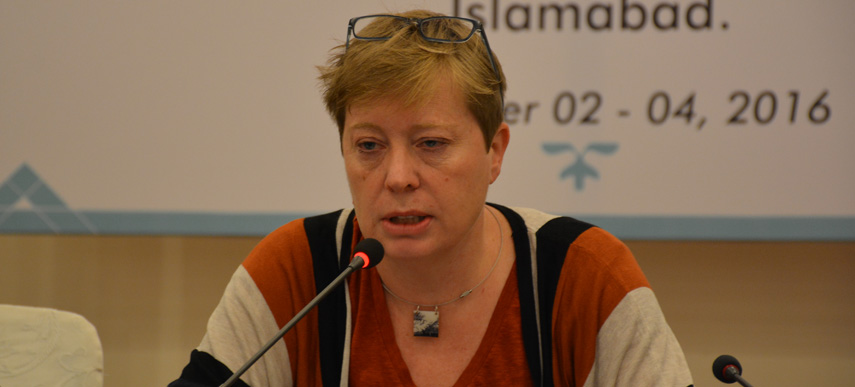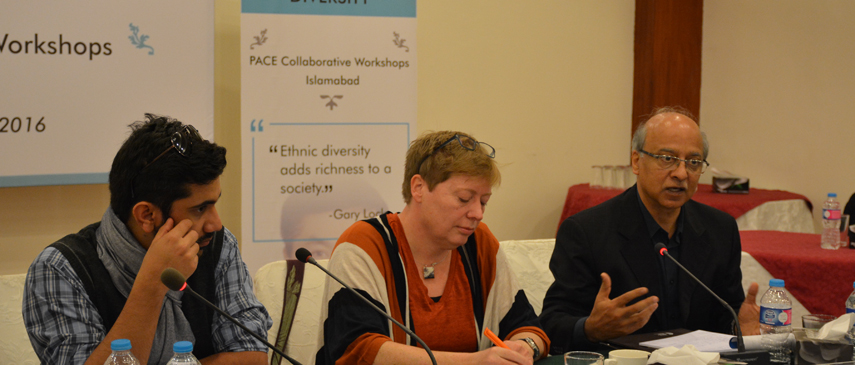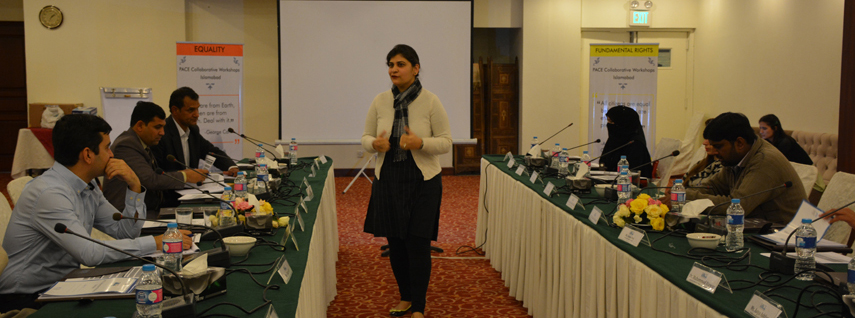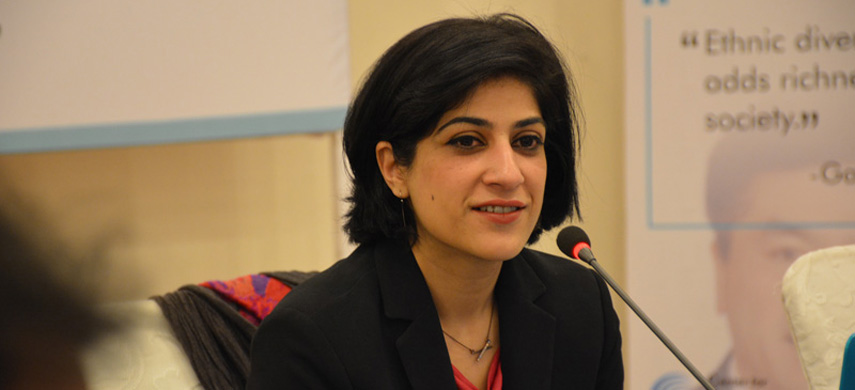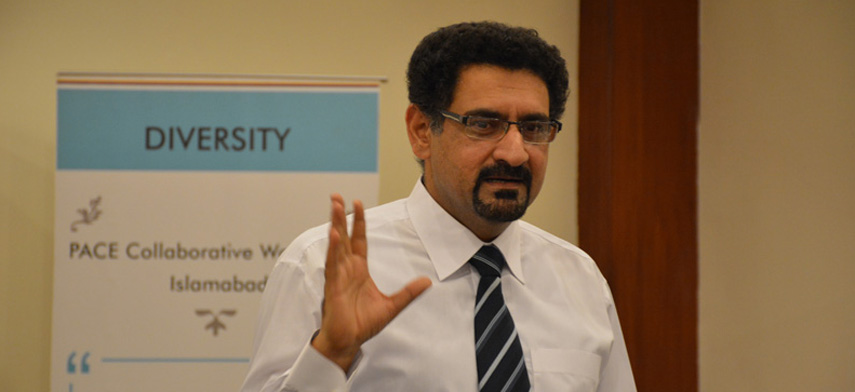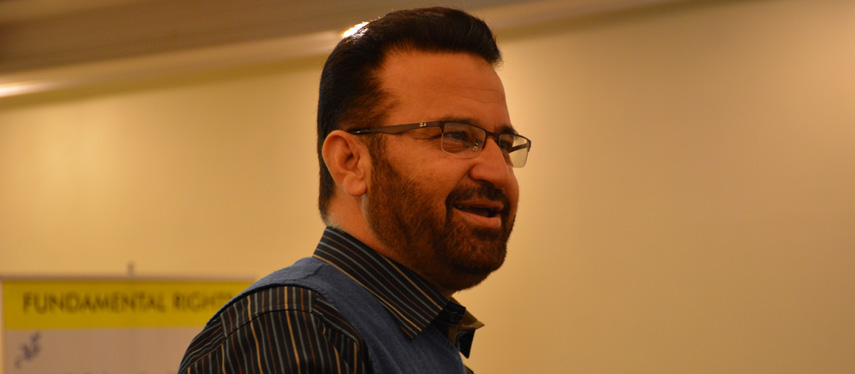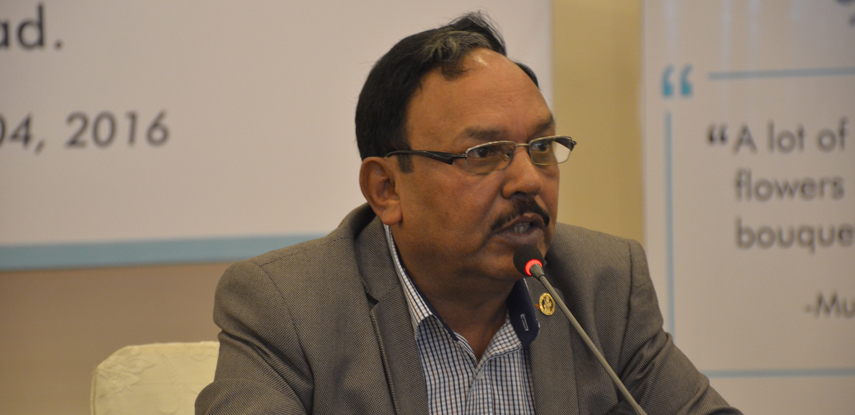The Center for Research and Security Studies (CRSS) conducted the 11th three-day collaborative workshop for young university lecturers and professors between December 2-4, 2016 at Hill View Hotel, Islamabad. The workshop was conducted under the umbrella of the Pakistan Center of Excellence (PACE), a counter-radicalization, pluralistic values focused project, in collaboration with the Dutch Government. Participants included young university lecturers and professors from University of Lahore, Islamabad, Balochistan University of IT, Engineering and Management Sciences, Quetta, Abbottabad, Mirpur University of Science and Technology, Mirpur AJK, Fatima Jinnah Women University, Rawalpindi, University of Balochistan, Quetta, Karakoram International University, Gilgit Baltistan, University of Sargodha, Sargodha, Arid Agriculture University, Rawalpindi, International Islamic University, Islamabad, Sindh Agriculture University, Tando Jam, and Bacha Khan University, Charsadda.
Opening Ceremony
Mr. Zeeshan Salahuddin, Project Manager, welcomed participants to the workshop, saying that PACE is put together by CRSS to counter radicalization, inculcate critical thinking, question preconceived notions and narratives, and embed the national discourse in constitutionalism and the rule of law. He said that PACE is grounded in the universal values of tolerance and acceptance; tolerance is one virtue that leads to a range of other factors such as perseverance, coexistence and the idea of peace building. He elaborated that adherence to rule of law, respect for diversity, opinions and rights, and ideas of perseverance, coexistence, peace building and tolerance can be inculcated in the minds of the youth only by the teachers; the gate keepers of the future.
Her Excellency, Ambassador Ingrid Johansson of The Sweden was chief guest to the opening ceremony. She shared her views saying that Sweden has a small population of only 10 million as compared to its geographic area and the resources it holds. The Swedish government has provided a liberal and secular system where each citizen is identified with his/her constitution. Race, gender and religion is insignificant. The politics is not influenced by religion. Beside this, there is Freedom Speech Law which is in practice since 1766.
While speaking about the education system of Sweden, the Ambassador said that the educational system of Sweden is one of finest systems and it is free. It is obligatory at primary level for everyone. Literacy rate of Sweden is 99.7%. The people of Sweden are served with quality education. They take part in every activity where their opinion matters. People in Sweden are trained to believe in democracy and participation that’s why there is a strong sense of security. Every citizen is an asset; every citizen is equal in Sweden. A Swedish national can cast their vote from any part of the world through the embassies.
Mr. Imtiaz Gul, Executive Director, CRSS elaborated on the objectives of the training saying equal citizenry is a concept which is guaranteed in all the constitutions of the developed countries, including Pakistan. This workshop is designed to ponder on the issues we face in daily life but not on the basis of religion, we only have to deal with the twenty basic rights entitled to the citizens of Pakistan in the constitution.
Workshop Core Areas
The young professionals were trained in following areas:
- Leadership and motivation
- Equal citizenry and respect for rule of law
- Fundamentals of democracy, governance and accountability
- Respect for diversity, opinions and rights
- Rights of minorities and other marginalized groups
- Constitutionalism, and adherence to Pakistan’s Constitution, particularly articles 8-28
- The importance of asking critical questions in the pursuit of knowledge
Workshop Modules
The cadre of young lecturers was trained by the experts in the above mentioned fields including: Mr. Khurshid Nadeem, Ms. Gulmina Bilal, Ms. Amber Rahim Shamsi, Dr. Zubair Ghouri, Mr. Safiullah Gul, and Brigadier Samson Sharaf.
Mr. Khurshid Nadeem initiated his session on multiculturalism and pluralism with reference to Islam. He said that we use different terms in our daily lives and sometimes these terms lead to misunderstandings. Secularism is also a term that has always been under debate. We actually need to know from where did this term originate and how we can apply it in our daily lives. He elaborated that in Europe; secularism wants to make a society free of religious interference. In USA, it wants to ensure religious freedom of the people without interference of the state. There is another concept known as Islamic secularism, there are few states such as Indonesia that have diverse groups of people with different beliefs. In these states, you have to live with religious freedom and also respect the religious freedom of others. But when we talk about Islamic secularism is Pakistan, it is always criticized.
To appreciate and respect the differences within a society, is called multiculturalism or pluralism. If anyone tries to diminish the diversity from society, it is always against the law of the nature. One can see diversity in nature and if it was not there, we would not be able to imagine life in the universe. Same is the case with society, multiculturalism beautifies it. Islam appreciates diversity in every aspect of life: religious, political and social. Islam never restricts people from practicing their own beliefs.
Ms. Gulmina Bilal was second speaker of the day and spoke on the fundamentals of democracy, governance and accountability. Separation of power, pluralistic system, independent judiciary, free and independent media, respect for rule of law, accountability and transparency were shared and discussed as basic elements of democracy. She further elaborated that in a democracy, the final decision making power must rest with those who are elected by the people; it must be based on a free and fair election, and on fundamental principles of political equality. She also spoke about the merits and demerits of democracy.
She also spoke on how accountability may be used as a prerequisite for successful democratic systems and how democracy stabilizes with able leadership. In a democratic system, everyone is supposed to perform their duties honestly. Good governance, strong institutions and able leadership emerge in the societies where people have equal access to education, capital, opportunities and freedoms.
Second day was started with a session on “media and ethics” by Ms. Amber Rahim Shamsi. She started her session with a comment that the social media has become so important that it has lessened the role of specialist journalists. Business interest also influences the media.
She stimulated the discussion saying that moral compulsions should be considered while reporting. There is a legal framework that regulates media and makes it responsible. There are ordinances such as Press and Publication Ordinance 1962, Printing Presses and Publications Ordinance 1988, Freedom of Information Ordinance of 2002, Pakistan Electronic Media Regulatory Authority (PEMRA) of 2002, Defamation Ordinance of 2002, Contempt of Court Ordinance of 2003, Press, Newspapers, News Agencies and Books Registration Ordinance 2003, Press Council Ordinance 2002, Intellectual Property Organization of Pakistan Ordinance 2005, and Access to Information Ordinance of 2006 that put ethical compulsions on media in terms of reporting and broadcasting.
Freedom of speech is the right to articulate one’s opinions and ideas without the fear of government retaliation or censorship, or societal sanction. The term freedom of expression is sometimes used synonymously, but includes any act of seeking, receiving and imparting information or ideas, regardless of the medium used. The right to freedom of expression is recognized as a human right under article 19 of the Universal Declaration of Human Rights and recognized in international human rights law in the International Covenant on Civil and Political Rights (ICCPR).
Every citizen of Pakistan shall have freedom of speech as well as expression. Freedom of speech and expression is the major fundamental right of the people of Pakistan.
She stressed on the importance of being neutral and presenting authentic news. She said that words are misinterpreted very often when it comes to sensitive issues; therefore, extreme care should be taken while debating on such issues.
Dr. Zubair Ghouri kicked off the second session of the day on the topic of “respect for diversity, rights and opinions.” He said that as citizens of the Islamic Republic of Pakistan, whenever we talk about humanity and humanitarian affairs, we are closely linked with the Islamic concept of human rights and equality. The constitution of Pakistan guarantees equal rights to all the citizens but the preamble restricts equal citizenry by defining the concept of divine sovereignty. But there are a few minority groups who don’t believe in divine sovereignty and on the basis of their beliefs we deprive them off the concept of equal citizenry.
Mr. Safiullah Gul was the first speaker on the last day and he spoke on the topic of “leadership and motivation.” He emphasized the extent to which effort is directed towards a goal, and its components: activation, persistence and intensity.
He elaborated the phrase that he who fails to plan actually plans to fail and shared a story of a man who alone changed the course of history with motivation and persistence despite of all the opposition from the society. Being alone doesn’t actually matter if you have goals and objectives set in your mind. To achieve these goals, you actually need to overcome your fears and insecurities. An individual sometimes can set an example and be a motivation for others.
His session, filled with activities to enhance creative and critical thinking, focused on looking at things from a slightly different perspective to encourage problem-solving.
Brigadier Samson Sharaf kicked off his session of the day on the topic of “rule of law.” He talked about transparency, predictability, stability, accountability as major elements required for the establishment of rule of law. He said that we won’t be able to make everyone answerable before law until we follow these rules in our daily lives. Even all the religions of the world give us a certain kind of code of conduct to have a comprehensive idea of do’s and don’ts.
Ms. Farhana Kanwal, Project Coordinator PACE, in her concluding remarks, insisted that there is a dire need to revisit the widespread preconceived notions that have been passed through our cultural values in the society over generations. Teachers, with the responsibility of imparting values to the young generation in educational institutions, are the most valuable engines that can challenge common negative narratives that promote hatred and bigotry. She said that teachers have the ability to shape an entire generation’s mindset to propagate tolerance, diversity and equality.
She shared that the participants need to conduct these activities with their students to inculcate adherence to the rule of law and equal citizenry. CRSS provides financial and logistic support in this regard to lecturers and professors so that they can foster the universal ideals of tolerance and diversity in the young generations.

